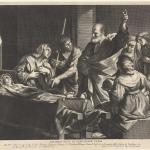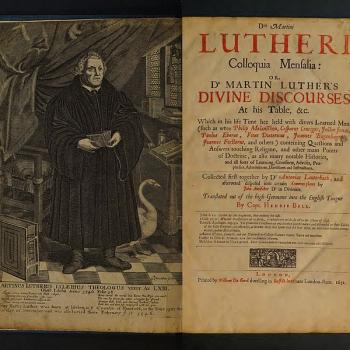Previously, over 18 years ago, I dealt at length with Luther’s negative comments made about James: that it was a book not written by an apostle, that it supposedly contradicts the soteriology of St. Paul, that it was “an epistle of straw” and either not fit for the biblical canon, or if so, only in a secondary, lesser sense (it was, in fact, included in his German Bible, and not thrown out). I noted how the potshot about James being “an epistle of straw” was removed from his 1545 revision of his Preface to the New Testament. This can all be found in my article, “Luther’s Radical Views on the Biblical Canon” (9-25-04; do a word-search of “James”).
I have written several times about Luther’s soteriology being much more complex than a radical “faith alone” / antinomian outlook, which is unfortunately often falsely attributed to him, by misinformed Catholics and Protestants alike (following polemical stereotypes):
Martin Luther: Good Works Prove Authentic Faith [4-16-08]
Luther on Theosis & Sanctification [11-23-09]
Martin Luther: Faith Alone is Not Lawless Antinomianism [2-28-10]
Merit & Sanctification: Martin Luther’s Point of View [11-10-14]
Calvinist Origin of Luther’s (?) “Snow-Covered Dunghill”? [5-14-19]
Luther’s Translation of “Faith Alone” in Romans 3:28 (Also: Did “Early Erasmus” Agree with Luther?) [12-7-22]
On almost any major issue, it will be found that Luther’s views are either flat-out self-contradictory, or that his positions vacillated throughout his lifetime (in some cases back-and-forth more than once). His view of the book of James was no exception. Presently, I’d like to present some relatively positive statements from Martin Luther about the book of James. The main themes are that works cannot justify by themselves (a position Catholics fully agree with, contra Pelagianism), and that faith must be accompanied by works (we again agree), and that justification is always by faith alone (here we disagree and say that it is by faith, which always includes works as two sides of one coin; therefore works are part of justification as well as sanctification).
So he ultimately disagrees with us in his overall soteriology, and separates sanctification from justification, in a way that Scripture and Catholicism do not. But on the other hand, he is no antinomian: the position that works are more-or-less totally separate and distinct from faith, even in terms of a separated sanctification, and this has welcome affinities with Catholic soteriology. Luther’s words below will be in blue.
See, this is what James means when he says, [2:26] “Faith apart from works is dead.” For as the body without the soul is dead, so is faith without works. Not that faith is in man and does not work, which is impossible. For faith is a living, active thing. But in order that men may not deceive themselves and think they have faith when they have not, they are to examine their works, whether they also love their neighbors and do good to them. If they do this, it is a sign that they have the true faith. If they do not do this, they only have the sound of faith, and it is with them as the one who sees himself in the glass and when he leaves it and sees himself no more, but sees other things, forgets the face in the glass, as James says in his first chapter, verses 23-24.
This passage in James deceivers and blind masters have spun out so far, that they have demolished faith and established only works, as though righteousness and salvation did not rest on faith, but on our works. To this great darkness they afterwards added still more, and taught only good works which are no benefit to your neighbor, as fasting, repeating many prayers, observing festival days; not to eat meat, butter, eggs and milk; to build churches, cloisters, chapels, altars; to institute masses, vigils, hours; to wear gray, white and black clothes; to be spiritual; and innumerable things of the same kind, from which no man has any benefit or enjoyment; all which God condemns, and that justly. But St. James means that a Christian life is nothing but faith and love. Love is only being kind and useful to all men, to friends and enemies. And where faith is right, it also certainly loves, and does to another in love as Christ did to him in faith. Thus everyone should beware lest he has in his heart a dream and fancy instead of faith, and thus deceives himself. This he will not learn anywhere as well as in doing the works of love. As Christ also gives the same sign and says: “By this shall all men know that ye are my disciples, if ye have love one to another.” John 13, 35. Therefore St. James means to say: Beware, if your life is not in the service of others, and you live for yourself, and care nothing for your neighbor, then your faith is certainly nothing; for it does not do what Christ has done for him. Yea, he does not believe that Christ has done good to him, or he would not omit to do good to his neighbor. (The Complete Sermons of Martin Luther Vol. 3:1, Michigan: Baker Books, 2000, 71-72; my bolding and italics)
In another sermon (unknown date), he stated:
This is what St. James means when his says in his Epistle, 2:26: ‘”Faith without works is dead.” That is, as the works do not follow, it is a sure sign that there is no faith there; but only an empty thought and dream, which they falsely call faith. Now we understand the word of Christ: “Make to yourselves friends by means of the mammon of unrighteousness.” That is, prove your faith publically by your outward gifts, by which you win friends, that the poor may be witnesses of your public work, that your faith is genuine. For mere external giving in itself can never make friends, unless it proceed from faith, as Christ rejects the alms of the Pharisees in Matthew 6:2, that they thereby make no friends because their heart is false. Thus no heart can ever be right without faith, so that even nature forces the confession that no work makes one good, but that the heart must first be good and upright. (The Complete Sermons of Martin Luther Vol. 2:2, Michigan: Baker Books, 2000, 308; my bolding and italics)
For this life is nothing more than a life of faith, of love, and of sanctified affliction. But these three will never be perfect in us while we live here on earth, and no one possesses them in perfection except Christ. He is the sun and is set for our example, which we must imitate. For this reason there will always be found among us some that are weak, others that are strong, and again some that are stronger; these are able to suffer less, those more; and so they must all continue in the imitation of Christ. For this life is a constant progress from faith to faith, from love to love, from patience to patience, and from affliction to affliction. It is not righteousness, but justification; not purity, but purification; we have not yet arrived at our destination, but we are all on the road, and some are farther advanced than others. (A Sermon on Confession and the Lord’s Supper; 1524; in Sermons of Martin Luther, The Church Postils; edited and partially translated by John Nicholas Lenker, 8 volumes. Volumes 1-5 were originally published in Minneapolis by Lutherans of All Lands, 1904-1906; Vol. 2)
In 1530, in reply to the question, “Why does James [2:26] say, ‘Faith apart from works is dead’?,” Luther wrote:
James is dealing with a moral point, not theological, just as he is almost entirely about morality. Morally speaking, it is true that faith without works is dead- that is, if faith does not do works or if outward works do not follow faith. In this way then, faith cannot exist apart from works; that is, it cannot fail to do works, else there is no faith alone.
We, however, are dealing with a theological point here since we are discussing justification before God. Here we assert that faith alone is counted as righteousness before God, apart from works and merits.” (Luther’s Works, Vol. 61 [published in 2021], 183-184; my bolding and italics)
And in his The Disputation Concerning Justification (1536), Luther responded to the proposition: “Faith without works justifies, Faith without works is dead [James 2:17, 26]. Therefore, dead faith justifies”:
The argument is sophistical and the refutation is resolved grammatically. In the major premise, ‘faith’ ought to be placed with the word ‘justifies’ and the portion of the sentence ‘without works justifies’ is placed in a predicate periphrase and must refer to the word ‘justifies,’ not to ‘faith.’ In the minor premise, ‘without works’ is truly in the subject periphrase and refers to faith. We say that justification is effective without works, not that faith is without works. For that faith which lacks fruit is not an efficacious but a feigned faith. ‘Without works’ is ambiguous, then. For that reason this argument settles nothing. It is one thing that faith justifies without works; it is another thing that faith exists without works. (Luther’s Works, Vol. 34, 175-176; my bolding and italics)
Luther even wrote in 1537, sounding very “Catholic” indeed:
Our justification is not yet finished. It is neither something which is actually completed nor is it essentially present. It is still under construction [to be completed in the resurrection]. (Disputation on the Works of the Law and of Grace, 1537; German: WA 39.1:252 / English: Luther’s Works, Vol. 71; cf. Paul Althaus, The Theology of Martin Luther, 245, footnote 96; my bolding and italics)
***
Practical Matters: Perhaps some of my 4,200+ free online articles (the most comprehensive “one-stop” Catholic apologetics site) or fifty-one books have helped you (by God’s grace) to decide to become Catholic or to return to the Church, or better understand some doctrines and why we believe them.
Or you may believe my work is worthy to support for the purpose of apologetics and evangelism in general. If so, please seriously consider a much-needed financial contribution. I’m always in need of more funds: especially monthly support. “The laborer is worthy of his wages” (1 Tim 5:18, NKJV). 1 December 2021 was my 20th anniversary as a full-time Catholic apologist, and February 2022 marked the 25th anniversary of my blog.
PayPal donations are the easiest: just send to my email address: [email protected]. You’ll see the term “Catholic Used Book Service”, which is my old side-business. To learn about the different methods of contributing, including 100% tax deduction, etc., see my page: About Catholic Apologist Dave Armstrong / Donation Information. Thanks a million from the bottom of my heart!
***
Photo credit: Luther posting his 95 theses in 1517; 1872 painting by Ferdinand Pauwels (1830-1904) [public domain / Wikimedia Commons]
***
Summary: I analyze some lesser-known positive remarks from Martin Luther about James, with regard to faith & works. As usual, he is complex and self-contradictory.

















